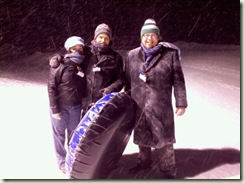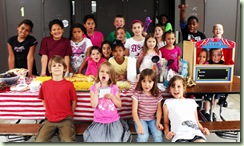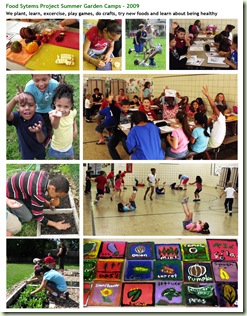Written by: Jaymes Pyne, Assistant Director in the Community Outreach Office at Grand Valley State University’s College of Education
Last week I attended a Learn and Serve - Michigan Service Learning Sustainability Symposium with some colleagues. The Symposium was intended for K-12 educators and service learning coordinators, but I was ecstatic to go as a representative from higher education because there was so much great information getting spread around!
Besides, my colleagues and I thought collaborating with teachers in the trenches would also help inform our work with teachers on environmental service learning though the Groundswell initiative and various College of Education service-learning initiatives.
Facilitating the symposium were Traci and Matt from KIDS Consortium, a Maine-based organization promoting an award-winning model for service learning education. Over the course of two full workshop days, Matt and Traci worked with school district teams to develop action plans for educating others in their district and sustaining a service learning program for years to come. The diversity and knowledge coming from these districts is impressive, to say the least, and I witnessed the beginnings of some fantastic models for institutionalized service learning.
But I want to take this time to share all the wonderful resources that KIDS Consortium has to offer. Through games and organized guides, KIDS makes it easy for professionals new to service learning to get the basic principles:
The What Is It? Game – I find that the greatest challenge when working with college students and education professionals new to service learning is just agreeing on what service learning is! So many times there is a misconception that community service and service learning are synonymous. Not so! The What Is It? Game provides specific scenarios of students doing either community-based service, community service, or service learning, and asks the participants to place each scenario into one of those three definitions. Through this process, participants get to process these fundamentally different service experiences and get to the heart of what service learning actually is.
Working with KIDS - Sometimes all you need is a simple walkthrough of the steps of service learning. This textbook offers a well-organized and comprehensive strategy for planning and implementing service learning with a class of students. It covers the process of service learning and provides examples of great projects, how to work together with students on planning and implementing a youth-driven project, and how to sustain project partnerships with community organizations.
Free Project resources - Take some time to see what KIDS has on their website, whether you're starting from the perspective of service or content area.
****
Better yet, if you have the chance to attend a KIDS event, do it! You will not be sorry. I should insert here that I have no affiliation whatsoever with KIDS Consortium; I just love their stuff!
As a final note, it must be stated that Learn & Serve knows how to put on a symposium. We spent the 2 1/2 days at the beautiful Shanty Creek Resort, where there was even one night of snow tubing. Yes, you should have seen the operators' faces as an army of wool jackets and dress shoes marched up the hill on a blustery 12 degree winter evening, racing down the hill in tubes without a second thought! The picture below is of myself (middle) and two of my colleagues who also attended the symposium.

This blog was originally posted at http://colleaguesplus.com/. To view more blogs written by Jaymes Pyne, click here: http://colleaguesplus.com/blogs/pyne.
 Students also harvest produce from the school gardens to sell at a youth farm stand. The stand made more than $300 last year, and all excess produce was donated to low income senior apartments. This summer, the School Garden-Based Nutrition Education program plans to participate in the new Westside Farmer’s Market, with plans to donate excess produce to the Greater Lansing Food Bank to distribute to low-income families.
Students also harvest produce from the school gardens to sell at a youth farm stand. The stand made more than $300 last year, and all excess produce was donated to low income senior apartments. This summer, the School Garden-Based Nutrition Education program plans to participate in the new Westside Farmer’s Market, with plans to donate excess produce to the Greater Lansing Food Bank to distribute to low-income families. 



